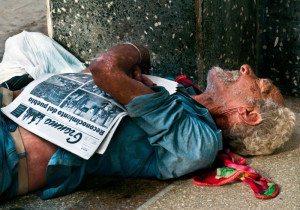Were they a bunch of looneys? A congregation of relentless romantics? Eccentric dreamers? Did they really believe that they were able to reach the moon by just stretching out their hand?

They were a group of Cubans who, armed with courage, stubbornness and love of freedom, tried to start a newspaper in which they could denounce human rights violations committed in Cuba.
PPDHC, the Cuban Human Rights Party they represented, was created on July 20 1988 and the only thing they needed was a press room that would publish a simple newspaper of three to four pages, printed by hand and distributed in secret.
The Gonzalez family lived in a small apartment in an old building located at the corner of Reina and Lealtad streets. There were four of them: Lidia, her husband Manuel and their two children, Isis and Manolito, of 20 and 26 years of age respectively. All of them were workers, honest and humble people.
In 1980, the family went to the embassy of Peru with the intention of breathing the air of freedom in the United States, but they were deceived, left stranded. The official press called them criminals and scum of the society. Later on, all four of them entered the PPDHC (Cuban Human Rights Party) and started collecting signatures to demand a referendum on Castro. They stood out as strong advocates of a peaceful opposition.
In cooperation with several other activists, the family managed to produce the Franqueza newspaper (“Frankness” in English) using only their typewriter. In order to avoid suspicion, they used to play the radio to cover the constant tapping of the keys of the typewriter. The newspaper was then distributed among dozens of members of the Party as well as among neighbors and passers-by in the streets of Havana.
The heart and soul of the project was the psychiatrist Samuel Martinez Lara, who died in exile several years after the launch of the newspaper. He offered both his name and energy to ensure that the newspaper could come out on more than two occasions.
I took hold of a copy of the Franqueza newspaper in one of the dark cells of the Manto Negro prison for women in December 1988,. Reading it, I couldn’t believe my eyes. My fellows had finally ventured to create their own press agency for their Party to allow Cubans to get other information than that approved by Fidel Castro (the only information published in the island, which was as true then as it is true now).
Naturally, everybody was able to foresee the outcome of such huge boldness. A few days later, Lidia, her husband and their son Manolito were imprisoned. Lidia shared the cell with me. They were charged with “enemy propaganda” and after they served their unjust sentences, they went into exile in Miami.
A simple sheet of white paper folded in four and entitled Franqueza had upset Fidel Castro way too much and he made it clear in his speech delivered on July 26, 1988: “In Cuba we will not tolerate small-time political parties or newspapers other than the national ones.”
Yet, it was inevitable to open up a crack in the hard wall of the regime, it was necessary to show the dictator that there are brave men and women in Cuba and that he had no right to have the first and the last word.
Time has proved us right.

Leave a comment